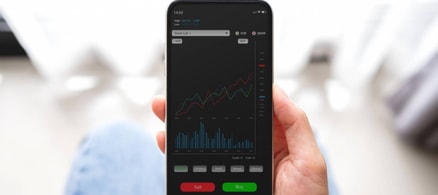What are ETFs?
ETFs, or exchange-traded funds, are investment funds that are easy to buy and sell because they trade on stock exchanges just like stocks. They even have their own ticker (trading) symbols.
When you buy a stock, you're buying an investment in a single company. But when you buy an ETF, you're buying stakes in lots of companies — or stakes in other assets, including bonds and commodities. There are ETFs that invest in oil and gold.
Often, an ETF is designed to mimic a market index, like the Dow Jones Industrial Average or the S&P 500, so what you're buying are pieces of all of the individual securities that make up the index.
If the underlying index is performing well, the ETF should perform well, too.
Meet Your Retirement Goals Effortlessly
The road to retirement may seem long, but with WiserAdvisor, you can find a trusted partner to guide you every step of the way
WiserAdvisor matches you with vetted financial advisors that offer personalized advice to help you to make the right choices, invest wisely, and secure the retirement you've always dreamed of. Start planning early, and get your retirement mapped out today.
Get StartedWhat are mutual funds?
Mutual funds, which are more traditional, are created from scratch. A team of investment professionals puts together a mix of stocks, bonds, money market accounts and other assets.
Like ETFs, mutual funds are designed to be diverse investment vehicles.
How do you tell how well a mutual fund is performing? Like stocks and ETFs, mutual funds have per-share prices, called the net asset value, or NAV. But it's assigned just once a day, after the financial markets close.
The NAV is the price of one share in the fund, before applicable sales charges. It's calculated based on the mutual fund’s assets, liabilities and outstanding shares.
Key differences between ETFs and mutual funds
By this point you may be shrugging, because ETFs and mutual funds probably still sound pretty similar. Well, here are five ways you can tell them apart — and decide which is the better choice for you.
1. How they’re managed
ETFs are passively managed while most mutual funds are overseen by a single portfolio manager or a team of experts.
Remember that ETFs are modeled after specific indexes. The stocks and companies involved have already been determined, so ETFs require little maintenance. They just go with the flow as the market dictates, and investors buy and sell accordingly.
With mutual funds, there's more human involvement. Investors leave everything to trustworthy experts who are committed to turning a profit for them.
Each mutual fund has a prospectus that outlines its goals, which might include sniffing out underdog stocks or achieving long-term growth. The managers assemble the mix that's most likely to achieve the goals of the portfolio and its investors.
Fund managers consider price-to-earnings ratios, momentum, dividends, risks and a host of other metrics. You could call them professional stock-pickers.
It's also their job to identify and sell off any stinkers in the portfolio.
2. How they’re traded
Much like stocks, ETF shares are traded among investors throughout the market day. Prices fluctuate with the market.
This creates opportunities for investors to take advantage of market swings. It’s a more hands-on approach to investing.
Mutual fund transactions, on the other hand, take place only at the end of the trading day. Sales and purchases are made between fund managers and investors according to the day's NAV.
3. How they’re taxed
ETFs are somewhat more tax-efficient than mutual funds, at least in the short term.
If an investor in a traditional mutual fund wants to take his or her $50,000 stake elsewhere, the fund must sell stocks to raise the cash.
If the stocks have gone up in price, the entire fund takes on the capital gain. It's then passed on to the mutual fund's remaining shareholders at year’s end, and they assume the tax burden.
Many ETFs have found a way to avoid these capital gains distributions: They won’t sell stocks to pay investors who want out, but instead they pay off the investors with shares currently in the portfolio. These are known as in-kind redemptions.
ETF investors can reinvest the stocks or gradually sell them off, which spreads out the tax liability over time.
4. Cost of participation
ETFs typically cost less to buy into. In some cases, just buying a single share will get you a piece of the action.
Some funds are fee-based while others charge a commission for every transaction, but operation costs are generally lower than those for mutual funds. That’s because of the way ETFs practically run themselves.
Since mutual funds are managed by people trying to earn a living, they come with higher overhead. Naturally, that’s passed down to investors.
And, the required minimum investment in a mutual fund is usually higher than for ETFs. There are a few mutual funds with no minimum, but most ask for somewhere between $500 and $3,000. Some institutional funds require an investment of as much as $1 million.
5. Short- vs. long-term investment
Finally, by nature of the way they’re traded, many investors view ETFs as short-term investments and mutual funds as long-term investments. That’s not necessarily accurate, but it’s easy to see why people think that way.
If you make several favorable trades in an ETF over a week or even a day, the investment feels short-term because you instantly see the profits. It’s quick cash — to spend, save or reinvest.
Mutual funds may seem dull by comparison. Investors tend to turn over their accounts to fund managers. They trust the experts to work their magic, and they check in only rarely to see how their investments are faring.
Both types of investors hope to cross the finish line with fully funded retirements, but the ETF trader might feel slightly more winded. An ETF feels like a 100-yard dash. A mutual fund is more like a carefully paced marathon.
Stop overpaying for home insurance
Home insurance is an essential expense – one that can often be pricey. You can lower your monthly recurring expenses by finding a more economical alternative for home insurance.
SmartFinancial can help you do just that. SmartFinancial’s online marketplace of vetted home insurance providers allows you to quickly shop around for rates from the country’s top insurance companies, and ensure you’re paying the lowest price possible for your home insurance.
Explore better ratesETFs vs. index funds
ETFs come closest to the mutual funds known as index funds.
Like many ETFs, index funds have portfolios that attempt to match a financial market index, like the Dow Industrials or the S&P 500. In theory, all you need is to keep an eye on the index to know how your investment in an index fund is doing.
Index funds are passively managed, so they don't have the overhead associated with other mutual funds.
While ETFs are easier to buy into and require less documentation than index funds, many individual investors prefer index funds — because they find the overall costs are lower.
ETF or mutual fund: How do you choose?
Your choice depends on how you like to trade and what you hope to achieve.
ETFs are more flexible, because you can trade based on market trends and leverage the fluctuations to your advantage. ETFs are more liquid than mutual funds, which could come in handy in a financial emergency.
Remember that mutual funds, including index funds, are priced once a day. You have just one opportunity to buy or sell shares.
But mutual funds may be a smarter investment if you regularly contribute to a retirement account or college fund, because trade commissions won’t eat into your returns.
Also, most 401(k)s and similar plans offer mutual funds rather than ETFs. That could be one reason why U.S. mutual funds held around $18.7 trillion in assets in 2017, versus $3.4 trillion in ETFs, according to the Investment Company Institute.
The ETF vs. mutual fund dilemma is largely a matter of personality, preference and investment goals. Both are ideal vehicles for diversifying your portfolio. If you tried to get the same broad exposure on your own, you’d have to buy dozens of individual securities.
Sponsored
Follow These Steps if you Want to Retire Early
Secure your financial future with a tailored plan to maximize investments, navigate taxes, and retire comfortably.
Zoe Financial is an online platform that can match you with a network of vetted fiduciary advisors who are evaluated based on their credentials, education, experience, and pricing. The best part? - there is no fee to find an advisor.








